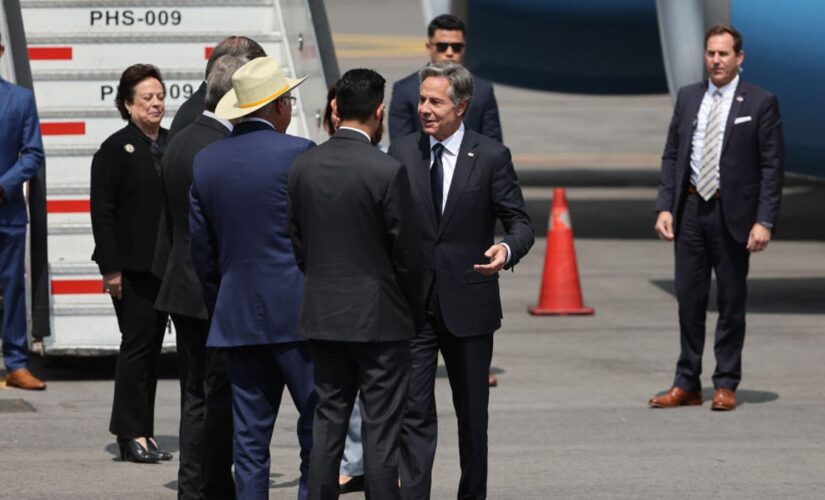NEWYou can now listen to Fox News articles!
MEXICO CITY, Mexico – Beijing has been carefully looking to increase its influence in Latin America and with it, observers claim, advance its geopolitical goals. For decades, China has been investing in the region and building close relationships with politicians of undemocratic regimes who make decisions to benefit the Asian giant not only economically and commercially, but also politically.
On Monday, Secretary of State Anthony Blinken came to meet with leaders in Mexico, including President Andr?s Manuel L?pez Obrador. Up for discussion was the U.S. and Mexico High Level Economic Dialogue that seeks to foster among other things regional prosperity.
While not mentioned publicly, China was likely on the minds of Blinken and his colleagues. China is Mexico’s second trading partner after the U.S, the third destination for exports and the second supplier of Mexican imports. In 2021, bilateral trade amounted to 110.27 billion dollars.
China’s dominance in the region is advancing with new strategies that go far beyond economic influence to encompass the political, military, security and even technological fields.
“When experts talk about China’s influence in Latin America, they mostly focus on their economic influence. The more than $153 billion in investments since 2005, and more than $140 billion in loans. While that is important, it’s more important to understand how China has leveraged that economic influence to gain military, intelligence, and geopolitical advantage in Latin America and the Caribbean, turning the region towards authoritarianism,” Joseph Humire, executive director of the Center for a Secure Free Society told Fox News Digital.
U.S. Secretary of State Antony Blinken arrives at Mexico City International Airport for an official visit as part of the US-Mexico High-Level Economic Dialogue on Sept. 12, 2022 in Mexico City.
(Photo by Hector Vivas/Getty Images)
MCCAUL: US MUST ‘WAKE UP’ AND INVEST IN LATIN AMERICA TO GAIN COMPETITIVE EDGE ON CHINA
Experts are concerned as China’s increasing influence could mean a further loss of to U.S interests in the region, especially at a time when most leftist governments are more pro-China than pro-U.S.
Observers claim Chinese leaders have created a dependency to maintain their dominance and advance their interests regardless of the government in power throughout the continent especially when it comes to some of the biggest and most influential countries in the region.
“In both the Brazilian and Argentine cases, China has become the primary customer for the agricultural commodities produced by these important countries. In the case of Brazil, China is the destination of 40% of Brazilian agribusiness exports. With this power, Beijing uses Brazil’s dependence on Chinese markets to exert negative pressure when its interests are threatened or simply criticized” explains Brazilian expert, researcher and author Leonardo Coutinho.
Experts have warned that the U.S. should not only be concerned but also take immediate action to compete on the same ground as it represents its own hemisphere where it must strategically act before China becomes more entrenched. Although China has built great economic influence, it no longer has the same capacity to invest and lend to countries as before when commodities were high, something that they themselves manipulated.
“China already has more than 40 port projects in progress in Latin America, established telecommunications through Huawei or ZTE, not to mention the rise in popularity of its social media app Tik Tok. For many Latin Americans this is normal commercial activity, but they are being deceived because beneath the surface is an effort to increase the social control of Latin Americans” warns Humire.
China’s flag and other red flags flutter in front of the Great Hall of the People in Beijing, China.
(Photo by VCG/VCG via Getty Images)
CHINA’S TIKTOK MAY FACE NEW US RESTRICTIONS DESPITE REVERSAL OF TRUMP BAN
Humire continued “for instance, when the U.S. Federal Communications Commission said, earlier this year, that ‘Tik Tok functions as a sophisticated surveillance tool that harvests extensive amounts of personal and sensitive data.’ These sort of facts are often lost on Latin Americans and the Chinese government capitalizes on this with disinformation and deception at the highest level.”
COVID-19 became an opportunity for China to aggressively advance its agenda. Coutinho underlines that “the health emergency resulting from the COVID-19 pandemic made it straightforward how China would use this power as an instrument of blackmail. A significant leap from the soft power exercised in the past (with the installation of language schools and advertorials in the prominent Brazilian newspapers) to the purest “warrior wolf” diplomacy, as the aggressive action model of the Chinese ambassadors and diplomats came to be called”.
He explained “this was possible because, between soft power and “warrior wolf” diplomacy, China exercised a silent and competent strategy of sharp power. That included the capture of elites (academics, journalists, and politicians, mainly) who, rewarded with trips, scholarships, and advertising funds, formed a choir to defend Chinese interests in the region.”
“In Brazil and Chile, for example, the Chinese managed to take advantage of the panic during the pandemic to sell millions and millions of doses of their vaccines, even though they have never (until today, it is worth noting) been thoroughly tested or definitively approved. There was a collective silence about the precariousness of the process, and the critics were punished. In Brazil, a chancellor was even fired for criticizing the lack of democracy in China, something the Chinese embassy made society understand could harm the relations between the two countries.”
He says another country under Chinese influence is Argentina. “One of the most symbolic cases is how Argentina gave up part of its territory so that the Chinese could build a satellite signal reception station, which, although it is formally for civilian use, is administered by the Chinese military, and the Argentineans are denied access.”
CLICK HERE TO GET THE FOX NEWS APP
Chinese President Xi Jinping, right, and then Argentinian President Cristina Fernandez shake hands after signing documents following their meeting at the Great Hall of the People in Beijing in 2015.
(AP Photo/Rolex Dela Pena)
An example of the of how far Chinese leaders are willing to go when they do not get what they want happened in Paraguay where “the local government suffered retaliation from the Chinese, who refused to sell medical supplies and sabotaged vaccine exports because the South American country recognizes Taiwan as a country. Beijing conditioned the end of the blockade to the rupture of Paraguay’s relations with Taiwan. Paraguay does not change this position” said Coutinho.
Humire cautions that the U.S. should be very concerned with is freedom is being lost in the Western Hemisphere and the role China is playing with that he says is key. “Beyond its economic influence, China is building authoritarian influence in Latin America and its key to success is propping up the region’s most brutal autocratic leaders. This is why, for the last 20 years, more than 75% of the credits that the People’s Republic of China has provided to Latin America, went to the four most autocratic regimes: Cuba, Venezuela, Nicaragua, and Bolivia”.




